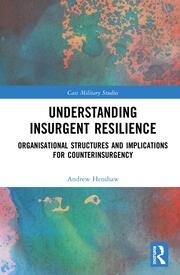Understanding Insurgent Resilience: Organizational Structures and the Implications for Counterinsurgency
By : Andrew D. Henshaw
Release date: Jul 2020
Routledge London
Number of pages: 311
ISBN: 978-0-367-46316-8


This book examines terrorist and insurgent organisations and seeks to understand how such groups persist for so long, while introducing a new strategic doctrine for countering these organisations.
The work discusses whether familial or meritocratic insurgencies are more resilient to counterinsurgency pressures. It argues that it is not the type of organization that determines resilience, but rather the efficiency functions of social capital and trust, which have different natures and forms, within them. It finds that while familial insurgencies can challenge incumbents from the start, they weaken over time, whereas meritocracies will generally strengthen. The book examines four of the most enduring and lethal insurgent organizations: the Haqqani Network in Afghanistan, Lashkar-e-Taiba in Pakistan, Jemaah Islamiyah in Indonesia, and the Abu Sayyaf in the Philippines. The author breaks down each group into its formative strengths and vulnerabilities and presents a bespoke model of strategic counterintelligence that can be used to manipulate, degrade and destroy each organization.
Andrew D. Henshaw is an independent advisor to governments on defence and intelligence issues. He has 27 years’ experience in military Special Forces and Counterintelligence operations and has a PhD from Macquarie University, Australia.
Table of Content
Part I: Introduction to Insurgency and the Function of Organizations
1. Introduction
2. The Foundations of Resilience
Part II: Real World Analysis
3. The Haqqani Network
4. Lashkar-e-Taiba
5. Jemaah Islamiyah
6. Abu Sayyaf
7. Findings
Part III: A New Approach
8. Strategic Counterintelligence











